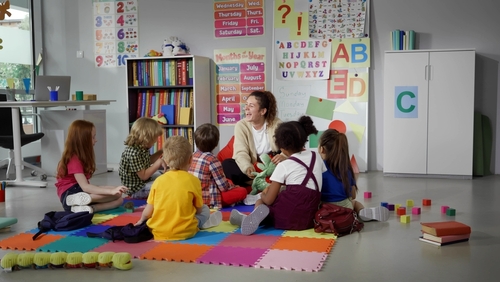
Parent, Infant & Early Childhood
We work to address the social and emotional development and mental health needs of infants and very young children through supporting parents and caregivers, and through training the workforce who work with very young children. Our Parent, Infant, and Early Childhood (PIEC) team supports workforce development by providing high quality, relevant, and translational training and coaching, technical assistance, facilitation, consulting, implementation support, and research and evaluation. We also provide policy analysis, systems design and financing, data-driven strategic planning, and quality improvement for systems and programs serving young children and their families.
Our team is deeply involved in the promotion, implementation, and evaluation of community-driven, evidence-based practices that have demonstrated success in supporting the social and emotional needs of infants and very young children as well as their families. We have experience with and expertise in the following models and programs:
- Pyramid Model for Social Emotional Competence
- Infant and Early Childhood Mental Health Consultation
- Facilitating Attuned iNteractions
- Screening, Brief Intervention and Treatment
- Attachment and Biobehavioral Catch-up Model
- Child-Parent Psychotherapy
- Circle of Security
- Chicago Parent Program
- Parent Child Interaction Therapy
- Wrap-Around Service
- Multisystemic Therapy
- Functional Family Therapy
- Nurturing Parenting Program
Our work is grounded in developmentally appropriate, community centered, and trauma informed practices ensuring that the stressors that impact the mental health of families, including poverty, are carefully considered in our work.
Our team has an extensive profile of projects that focus on improving the amount and quality of infant and mental health services across a variety of settings including early education and childcare, pediatrics, among incarcerated parent populations, with substance use and mental health centers, and with agencies serving homeless and housing unstable youth. We have experience working within systems of care on efforts to develop robust service arrays that are informed by the needs of infants, toddlers, and families, as well as the elevation of family voice.
Highlighted Resources
Almost 450 early childhood specialists attended our inaugural Northeast Regional Pyramid Model Conference!
NEW PUBLICATION! Uniting Infant Mental Health & The Pyramid Model. Watch the recorded Book Talk from 5/2025!
NEW! Pyramid Model Practice Guide meets the needs of early childhood educators! Read the story about developing these critical new resources.
Circle of Love Podcast! This podcast highlights the story of one family navigating child welfare & becoming advocates for kinship care. Listen here!

Work With Us
We provide training and coaching, technical assistance, implementation support, and research and evaluation supports to create community centered, trauma-informed systems for young children, their caregivers, and providers who serve young children and their families. Click on one of the focus areas below and contact us for more information on how we can support your work with early childhood populations.
Policy Consultation
- Incorporating Infant and Early Childhood Mental Health and caregiver related screenings, assessment practices, and EBPs within systems serving young children and families
- Addressing Exclusionary Discipline Practices in Childcare and Early Education
Workforce Development/Training/Coaching
- Building customized trainings, including interactive eLearnings on Infant and Early Childhood Mental Health topics
- Trainings on coaching and reflective supervision for the mental health and early childhood education workforce
- Trainings on working with families navigating behavioral health services for infants and young children
- Trainings on supporting parent and caregiver stress and mental health within child serving settings
- Building customized resources, such as tip sheets, infographics, guides, toolkits, and animations
Research & Evaluation Support
- Consultation, staff training, and coaching on confidential strategies to collect and document early childhood mental health and early childhood programming related data
- Research and evaluation support for program and grant development, and implementation focused on infant and early childhood mental health, caregiver support, early childhood education, and other related projects
- Consultation on how to use system data to improve practices for young children and their families
Current & Recent Projects
Pyramid Model Practice Guide
The Pyramid Model practice guide provides resources and recommendations that are critical for teachers utilizing Pyramid Model practices in their classrooms and learning to think differently about how they address challenging behaviors. The guide — freely available through an interactive website with downloadable pdfs in English and Spanish (https://pyramidmodelpracticeguide.org/) — is designed for childcare providers and classroom teachers to embed Pyramid Model practices in current classroom routines, schedules, and curricula. The guide is also useful and relevant to administrators, coaches, Infant and Early Childhood Mental Health Consultants–all working with and supporting classroom educators.
Building Strong Foundations: Expanding & Sustaining Early Childhood Mental Health Services
The Building Strong Foundations (BSF) program, funded by SAMHSA to the Mental Health and Recovery Board of Union County, Ohio (MHRBUC), is an early childhood mental health system of care project. The PIEC team is partnering with MHRBUC to provide evaluation and workforce development support. BSF aims to increase access to early childhood mental health programs and embed evidence-based and trauma-informed care within schools and communities, including Infant and Early Childhood Mental Health Consultation (IECMHC) and Pyramid Model (PM).
Family Attachment-Focused Services, Treatment & Training
The Family Attachment-Focused Services, Treatment & Training (FASTT) program, developed in partnership with Adventist HealthCare’s Lourie Center for Children's Social & Emotional Wellness, is designed to increase access to critical early childhood mental healthcare by supporting workforce development in the field. More trained professionals will make it possible to serve more at-risk children and families, improve the quality of care and reduce assessment wait times for access to services. The PIEC team is supporting FASST as the evaluation lead for the project and by contributing to workforce development through training and coaching in the Early Childhood Service Intensity Instrument (ECSII), Screening, Brief Intervention and Referral to Treatment (SBIRT), and Facilitating Attuned iNteractions (FAN).
Kennedy Krieger Institute’s PACT Pyramid Model Implementation Project
The PIEC team supported program-wide implementation of the Pyramid Model for Social Emotional Competence within a demonstration site for special-needs and special education preschool, childcare, and Early Head Start service delivery. This included training, coaching, and evaluation of the Pyramid Model within the site and collaboration with other evidence-informed programs being implemented at the site.
Maryland Cares
In partnership with the Johns Hopkins University School of Education, we received funding from the Maryland State Department of Education’s Division of Early Childhood to develop and disseminate a Pyramid Model Practice Guide to support early care and education providers to deepen their Pyramid Model practices with concrete guidance and supports, available in English and Spanish. This grant allowed our team to develop and disseminate a Positive Solutions for Families Facilitator Support Guide with resources and tools to Extend Conversations with Families around their routines and interactions with their child(ren) as well as supporting their own parenting stress and family needs.
UConn & Connecticut Office of Early Childhood Partnership
The Connecticut Office of Early Childhood (OEC) entered a partnership with the University of Connecticut School of Social work (UConn SSW) in 2018. The partnership supports outcomes-based programming and data systems for the state agency. The team has expertise in research methodology, data collection and analysis, program evaluation, data visualization, training, coaching, and technical support of early childhood workforce and two generational family practice. Examples of their work include needs assessments, childcare cost and market rate analyses, continuous quality improvement training, technical support, and cross agency data sharing. The collaboration between OEC and the UConn SSW team positions OEC to make data-informed decisions and enables them to share findings with stakeholders. Our PIEC team joined the OEC-UConn Partnership in 2023, bringing deeper analytic and policy expertise. We also helped expand the contract, adding behavioral health initiatives to the contract, and we are overseeing the implementation of the Pyramid Model in Connecticut.
Learn more about the partnership in this UConn Today story.
Pyramid Model Practices Within Early Intervention
The PIEC Team received funding from the Maryland State Department of Education’s Division of Early Intervention and Special Education to serve as subject matter experts supporting and evaluating implementation of Pyramid Model Practices within Part C Early Intervention Services within the four jurisdictions currently involved with the Maryland State Systemic Improvement Plan grant.
TREE & TREEHOUSE
TREE (Teaching, Reading, Engaging, and Encouraging) is a coaching program, created by members of the Maryland Chapter Academy of Pediatrics for pediatric providers that teaches them how to promote positive parent-child interactions during well-child visits. TREEHOUSE is a Health Resources and Services Administration (HRSA) funded, tele-health, version of TREE funded from 2021 to 2026.

New Publication!

Get your copy today! Uniting Infant Mental Health and The Pyramid Model: Connecting Principles and Practices to Improve Outcomes, edited by Lana Nenide, Kate Sweeney, Gerald Costa, Neal Horen, and Rob Corso published by Brookes Publishing is out! The book is designed for the infant and early childhood workforce to support their understanding of the integration of these two models to support and deepen their work with young children and their families.
Kate Sweeney and Margo Candelaria, co-Directors of our PIEC team, have two chapters in this volume, the first on Data Informed Decision Making within the many layers of this work, and the second on Family Coaching within Part C Early Intervention Services, detailing how Pyramid Model supports the practices of early intervention providers.
View the recorded Book Talk with Lana Shklyar Nenide and Kate Sweeney, two of the editors of Uniting Infant Mental Health and the Pyramid Model! Together they explore the book's core concepts to integrate the frameworks of Infant Mental Health (IMH) and the Pyramid Model (PM) with a common goal of supporting the mental health and social emotional well-being of infants, young children, and their families. In this recorded session from May 2025, Lana and Kate give an overview of the book's structure, discuss key takeaways for the various audiences, and review the many resources accompanying the book on the publisher's online hub.
Recent Publications
Candelaria, M., & Sweeney, K. (2025). Examining the Impact of Pyramid Model Implementation to Deepen Social and Emotional Supports for Enrolled Children Within Early Intervention. Healthcare, 13(5), 515.
Candelaria MA, Tellerman K, Hutchison H, et al. The TREE Program: Promoting Positive Early Childhood Experiences During Well-Child Visits. Clinical Pediatrics. 2024;0(0).
Candelaria, Margo; Shdaimah, Corey; Afkinich, Jenny; and Zhu, Yan (Stella) (2024) "Meeting the Challenge of COVID-19: Innovation and Adaptation in Services for Expectant and Parenting Youth in Baltimore," Journal of Human Services: Training, Research, and Practice: Vol. 10: Iss. 2, Article 3.
Lawrence, S.E., Candelaria, M., Isiminger, A., Hutchison, H., Bhandari, S., Mukherjee, B., Buch, H., Polar, J., & Gould-Kabler, C. (2024). PA #23-205 Legislative Request: Final Report. Home visiting, childcare, family resource center, and healthcare assets within “high poverty, low opportunity” communities in Connecticut. Prepared by the University of Connecticut School of Social Work as part of the Connecticut Office of Early Childhood Partnership.
Candelaria, M. & Feigelman, S. (2024). Chapter 18: Developmental and Behavioral Theories, In R. Kliegman & J. W. Geme (Ed). Nelson Textbook of Pediatrics, 2-Volume Set, Twenty-Second Edition. Elsevier, Inc.
Finigan-Carr, N., Candelaria, M., Sweeney Wasserman. (2023). Child and Family-Serving Systems: A Compendium of Policy and Practice, Volume III: Approaches to Family and Child Support and Sustainability. What Works When Supporting Expectant and Parenting Youth and Their Children.
Kohn, B. H., Cui, Z., Candelaria, M. A., Buckingham-Howes, S., Black, M. M., & Riggins, T. (2023). Early emotional caregiving environment and associations with memory performance and hippocampal volume in adolescents with prenatal drug exposure. Frontiers in Behavioral Neuroscience, 17, 1238172–1238172.
Candelaria, M., Tellerman, K., Wilms-Floet, A., & Whitty, H. (2022). The TREEHOUSE Project: promoting early childhood development and parent-child interaction via telehealth in pediatrics. ZERO TO THREE Journal, Invited Submission.
Candelaria, M., Afkinich, J., Sweeney, K., Latta, L., Kane, A. (2022). Workforce Development Needs to Address Early Childhood Mental Health within the Childcare and Early School Years Setting. Perspectives in Early Childhood Psychology and Education – Special Issue.
Afkinich, J., Torres, J., Latta, L., Sweeney Wasserman, K., Endy, K., & Candelaria, M. (2021). “Needed now more than ever”: Infant and early childhood mental health consultation in an unprecedented time. ZERO TO THREE Journal, 41(4), 26–33.